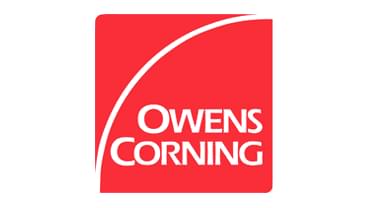Owens Corning Fiberglas Corporation
Owens Corning manufactured asbestos products from the 1950s through 1972. Asbestos litigation caused the company to file for bankruptcy in 2000. A trust fund was established to compensate victims. It contains approximately $1.07 billion.

Owens Corning’s Connection to Asbestos
Owens Corning used asbestos in its ceiling tiles, mastic, cement and insulation for pipes, air systems, equipment and cold storage systems from the 1950s to 1972. Companies used asbestos in many of its products because it could resist heat.
Owens Corning bought Fibreboard Corporation in 1997, which also made building and insulation products with asbestos. Because of this, Owens Corning became responsible for any harm Fibreboard’s asbestos products caused.
Owens Corning Asbestos-Containing Products
- Ceiling Tile
- Finishing Cement
- Insulating Cement
- Kaylo Duct Insulation
- Kaylo Equipment Insulation
- Kaylo Insulating Roof Tile
- Kaylo Pipe Insulation
- One Cote Cement
- Ready Mix
- Type II Mastic
The company began dealing with asbestos lawsuits in the late 1970s. Over the next 30 years, Owens Corning was named in hundreds of thousands of lawsuits. By the year 2000, the company had settled with 440,000 people who said they got sick from using the company’s asbestos products. Some had serious asbestos-related diseases like mesothelioma.
Who Was at Risk of Asbestos Exposure From Owens Corning?
People in the construction industry, especially insulators, were at risk of asbestos exposure when working with Owens Corning’s asbestos products. The company’s products were used in commercial, industrial and residential settings.
Occupations at Risk of Asbestos Exposure Through Owens Corning Products
- Carpenters
- Cement workers
- Construction workers
- Electricians
- Factory workers
- Insulators
- Military personnel
- Painters
- Pipefitters
- Plumbers
- Roofers
Owens Corning’s pipe insulation was often used on Navy ships, putting shipyard workers and Navy crew members at risk of asbestos exposure. Members of the military exposed to asbestos also had a higher risk of exposing their families to the dangerous mineral through secondary exposure. This happens when someone who works with asbestos carries home microscopic fibers on their hair, skin or clothing.

Gain access to trust funds, grants and other forms of compensation for you or your loved ones.
Get Help NowAsbestos Lawsuits Involving Owens Corning
Initial asbestos lawsuits against Owens Corning began in 1978 when Edward Scruggs and Donald Kaiser, shipyard workers who developed asbestosis, filed a lawsuit for themselves and 5,000 other workers. They sued Owens Corning and 14 other asbestos manufacturers. The lawsuit argued the companies knew asbestos was dangerous as early as 1938 but didn’t warn workers about the risks.
More than a decade after the initial lawsuits, Owens Corning faced about 84,500 asbestos cases. The company agreed to pay approximately $1.2 billion in 1998 to settle 176,000 asbestos-related claims. This settlement aimed to resolve about 90% of the company’s existing asbestos cases and established procedures for handling future claims over at least a 10-year period. When the company went bankrupt in 2000, it had been named in 243,000 asbestos-related claims.
In a 1997 case, a Florida jury awarded Deward Ballard $31 million in punitive damages and $1.8 million to cover his mesothelioma. The court said Owens Corning had hidden the dangers of asbestos for more than 30 years.
Owens Corning Asbestos Trust Funds
Owens Corning grouped 176,000 asbestos claims in 1998 into the National Settlement Program and planned to settle them for $1.2 billion to avoid bankruptcy. But the number of claims grew quickly to 237,000. Owens Corning filed for Chapter 11 bankruptcy in October 2000.
As part of its recovery plan, the company created the Owens Corning/Fibreboard Asbestos Personal Injury Trust in 2006. This trust was funded with $5 billion. By 2008, the asbestos trust fund had paid out $1.4 billion. In May 2011, Owens Corning sold 7 million shares of stock, and all the money from that sale went into the trust.
Today, people with approved claims receive only a small portion of their owed amount: 4.7% for Owens Corning claims and 3.7% for Fibreboard claims. The trust fund released a 2025 Approved Owens Corning Site List, which includes more than 20,500 locations in the U.S. where the company’s asbestos products are known to have been installed, used or made.
Legal Help for Survivors Exposed to Owens Corning’s Asbestos
Anyone diagnosed with mesothelioma or another asbestos-related disease stemming from exposure to Owens Corning’s products may be eligible to file an asbestos trust fund claim. An experienced asbestos lawyer will be able to ensure your claim is filed properly with all necessary documentation and on time.
If a loved one died from an asbestos-related illness, you may be able to file an asbestos trust fund claim. A knowledgeable mesothelioma attorney can help you through the process.
The Mesothelioma Center’s Patient Advocates are always available to patients and their families. Our Patient Advocates will help you find a lawyer you and your family will feel comfortable with and who is experienced with claims like yours. Our team can also connect you with support groups, leading mesothelioma specialists and help with VA claims and insurance.
Recommended Reading


